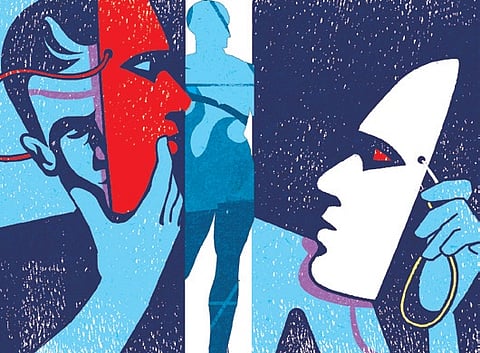The persistent problem of personality
Personalities, you see, are essentially masks—elaborate facades we don to navigate the stage of life. Picture us all as actors in a grand play, stepping into our roles through a revolving door, each rotation flipping us from one character to another. As soon as the curtain falls, we shuffle back to our off-stage quarters to prepare for the next scene.
In a conversation between two rival politicians in the Parliament, I imagine eight distinct personalities in play. First, there are the personas each person projects to the world. Then, there are the ways each perceives the other. The third set is how each views themselves, and the last is the public’s perception. It’s like a psychological kaleidoscope spinning with every dialogue.
Albert Camus once said, “We continue to shape our personality all our life. If we knew ourselves perfectly, we should die.” How dramatic! But he had a point. The evolution of the human self is akin to a revolution deep within our being. This metamorphosis is what transformed Gautam into Buddha, Valmiki into Vyasa, and Mohandas into Mahatma.
The very icons of history began to shed the layers of their personalities as they encountered deeper truths about life. Take Gandhi and Einstein. When these two titans of thought met, their personalities must have swapped and melded like colours on a painter’s palette. Gandhi, the soul’s scientist, and Einstein, the mystic mathematician, likely left each other with new shades of insight.
For those of us who live in the realm of fiction, authentic writing is akin to a wrestling match with one’s own personality. The goal is to shed your own persona and don the character’s mask. Your prose should function like a transparent glass window, giving readers a clear view into the world of your character. The term ‘personality’ itself derives from the Latin ‘persona’, meaning mask. Understanding this, you need to peer behind these masks to see the true self beneath. Our heroes, when stripped of their masks, often emerge as far more interesting figures.
The human personality is a complex blend of four elements: rationality, emotional fluidity, ingenuity and wilfulness. When rationality falters, we fall into irrationality. A lack of ingenuity makes us mechanical. If willfulness wanes, lethargy takes hold. And when emotions are stifled, we become numb.
I recall a boss of mine who was the poster child for emotional uniformity. Whether it was a wedding or weekly review meeting, a festival or a funeral, his face remained a stony mask. When a subordinate, fresh off a lost promotion, sought comfort, the boss responded with a fortress of dry logic and defensive explanations. The issue wasn’t the promotion but the emotional sting. Sometimes, all that’s needed is an arm around the shoulder—a simple gesture saying, “I’m here, emotionally available, like an open window.”
Love, in its finest form, is that magnificent force that breaks down the walls of our personalities. It’s the enchanting window through which we glimpse our truer, deeper selves. We all get stuck at various points in our lives. When you find yourself in a rut, where would you prefer to turn? To a solid wall or to an inviting window?
Debashis Chatterjee
Author, Professor & Director, IIM Kozhikode
successsutras@gmail.com

